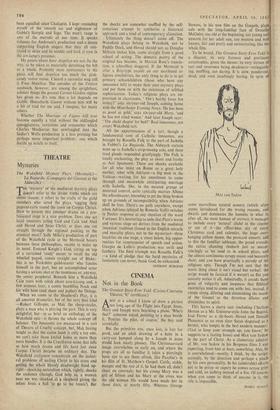THEATRE Mysteries
The Wakefield Mystery Plays. (Mermaid.)-- La Bugiarda. (Cornpagnia ddi GioVani at the Aldwych.)
THE `mystery' of the mediwval mystery plays doesn't refer to the divine truths which are above reason; it refers to the crafts of the guild members who acted the plays, tugging their pageant-carts round the town on Corpus Christi. How to• present this amateur drama on a pro- fegsional stage is a nice problem. Does one act local amateurs acting God and Cain and Abel and Herod and Jesus Christ, or does one cut straight through the regional packing to the essential meat? Sally Miles's production of part of the Wakefield cycle at the Mermaid hovers between these philosophies, unable to make up its mind. Esmond Knight's God, sitting on top of a curtained `study' meant to recall the old wheeled pagod, comes straight out of Blake: this is no Yorkshire- guild-master who fancies himself in the part, but an accomplished actor having a serious shot at the numinous or, anyway, the senior prophetal. Beneath him a Wakefield Cain rants with relish about arse-kissing and, a few minutes later, a comic bumbling Noah and his wife ham (and shem and japhet) the Deluge.
When we come to the Shepherd's Play, it is all amateur dramatics, but of the very best kind —Robert Gillespie, as Mak the sheep-stealer, plays a man who is playing the part. This is very delightful, but—in so brief an anthology of the Wakefield epic—it throws the whole concept off balance. The Innocents are massacred in a sort of Theatre of Cruelty concept, but, Mak having taught us that the stolen lamb is only a toy one, we can't take those knifed babes as more than mere bundles. It is the Crucifixion scene that tells us how much drama and life have lost since Corpus Christi became an ordinary day. The Wakefield craftsmen concentrate on the techni- cal problems of nailing Christ to his cross and getting the whole bloody deadweight fixed up- right—shocking naturalism which, rightly, shocks the audience (though, God help us, a woman near me was shocked at a shepherd giving the infant Jesus a ball `to go to the tennis'). But the shocks are somewhat muffled by the self- conscious attempt to synthetise a historical approach and a kind of contemporary alienation.
Ultimately the thing doesn't come off. The Wakefield plays belong to Wakefield, not to Puddle Dock, and Herod should not, as Douglas Milvain makes him, come straight from a good school of acting. The demotic poetry of the original has become, in Martial Rose's transla- tion, a schoolboy doggerel. If the Mermaid is after a Brig-type assault on our moribund re- ligious sensibilities, the only thing to do is to get primary schoolchildren (those who have any innocence left) to make their own mystery plays and put them on with the minimum of tellified sophistication. Today's religious plays are im- provised in classrooms. "Ow's bairby Jesus bin terday?' asks six-year-old Joseph, coming home with the Manchester Evening News. `He has been as good as gold,' says six-year-old Mary, 'and he has not cried wonce.' And later Joseph says: 'Ow abaht shapin' fer bed?' Real innocence, not ersatz Wakefield tart.
All the appurtenances of a tart, though a fundamental core of Catholic innocence, are brought by Rossella Falk to the part of Isabella in Fabbri's La Bugiarda. The Aldwych curtain went up to Isabella's strip-teasing sola, and these tired glands responded gratifyingly. The Falk is totally enchanting, the play as sweet and frothy as Asti •Spumante. There are shocks available for all who insist on Rome as a great holy mother, what with Adriano—a big man in the Vatican—waiting for his annulment to come through and meanwhile anticipating marriage with Isabella. She, in the moated grange of maternal control, quite cynically marries Albino the schoolmaster, intending to get the thing broken up on grounds of incompatibility when Adriano shall be free. There's no guilt anywhere, except when Adriano (played by Romolo Valli) twitches in Pavlov response at any mention of the word Vatican°. It's interesting to note that Pizzi's warm and various stage set derives from the mediteval `mansion' tradition (found in the English miracle and morality plays, not in the mysteries)—three localities on one stage, a street below, big oppor- tunities for counterpoint of speech and action. Giorgio de Lullo's production was swift and feathery. The final triumph was Rossella Falk's —a kind of pledge that the lucid mysteries of femininity can never, thank God, be exhausted.
ANTHONY BURGESS






























 Previous page
Previous page